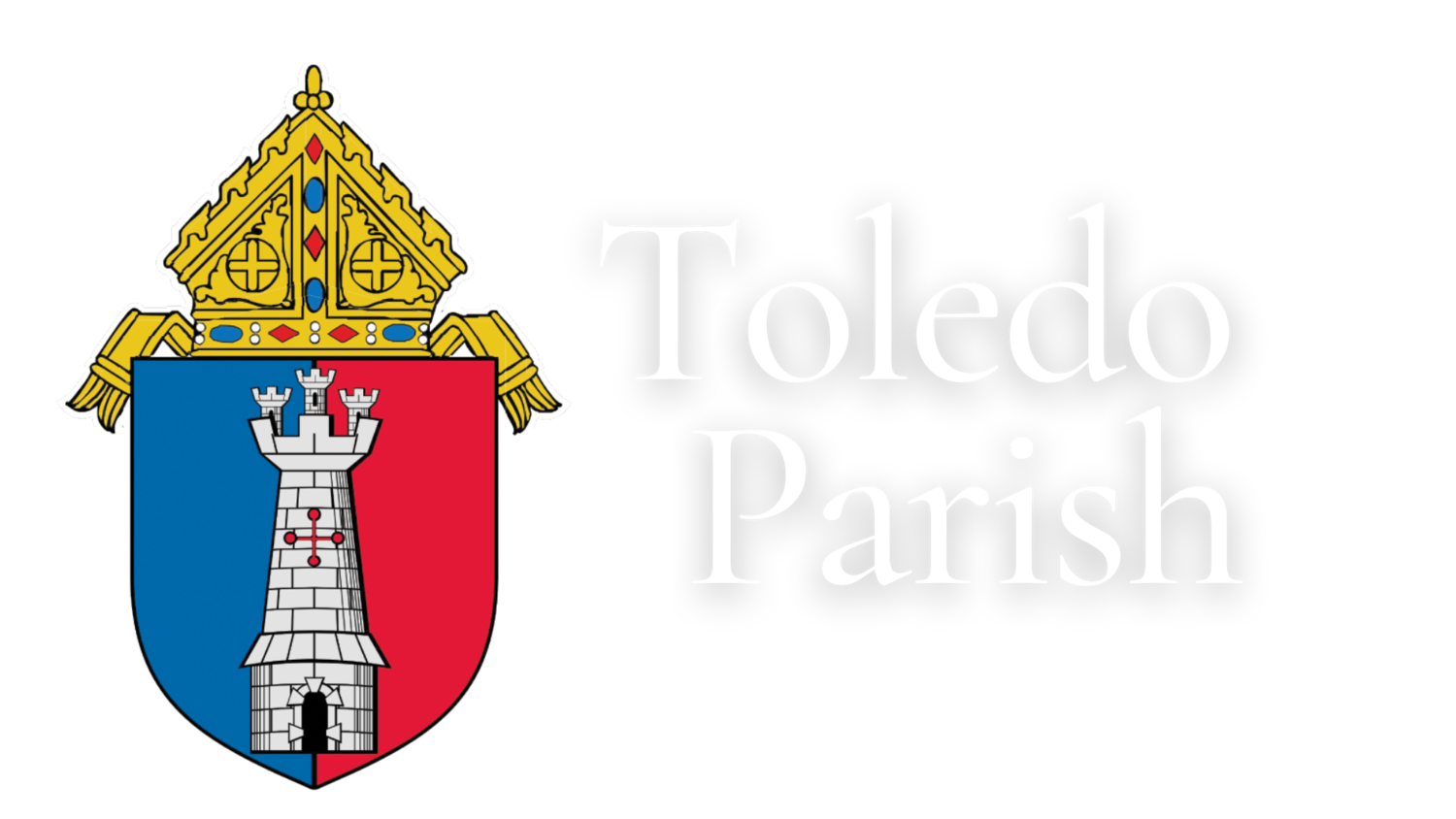Accessibility Ministries
Contact
Mrs. Lynn Priest | Parish Life Coordinator - lpriest@toledodiocese.org
BEST PRACTICES to Serve People with Disabilities in the Church
Serving people with disabilities in the church means actively creating an inclusive environment where everyone feels welcomed, valued, and able to participate fully in church life, which requires intentional effort to understand individual needs, communicate openly, and adapt practices to accommodate different abilities, ultimately seeing people with disabilities not just as those needing assistance, but as vital members of the congregation with unique gifts to share. The following list details some areas to consider in ministering to people with disabilities within the parish community.
Welcoming/Social Interaction
Welcoming/greeting begins with a genuine, simple “hello”. A warm, friendly, heartfelt greeting with a handshake requires no special training and should be shared generously and with enthusiasm.
Refer to people and call them by their name. Use care to treat all people with disabilities with utmost respect and avoid using a condescending tone.
Speak and look directly at the person with disabilities, rather than talking or interacting through a caregiver or family member.
Greet people with disabilities as you would their typical peers, even if they are non-verbal or communicate in non-typical ways. Do not assume they cannot understand you.
Be patient in offering your attention and response as it may take a person with disabilities more time to say or do things.
When in the presence of people with disabilities, take care not to talk about them as if they were not present.
Physical Accessibility
Ensure church entrances and those of other gathering spaces have ramps, elevators, and accessible parking. Doorways should be wide enough for wheelchairs, and restrooms should be equipped for people with mobility challenges. Consider installation of automatic doors at entrances/exits.
Designate accessible seating near entrances and exits, allowing for easy access.
Provide ramps or lifts to the altar inviting full participation in the liturgy, ministries and/or sacraments.
Have the ends of several pews adapted/shortened to allow people in wheelchairs to sit with family.
Consider installation of one or two pews 32” apart for use by people with walkers or crutches.
Parking
Clearly mark reserved parking for those people with disabilities and locate near entrances/exits.
Ensure pathways to and from parking are clear and free from obstacles.
Communication
Ensure all communications, including bulletins, websites, and newsletters, are accessible. Use large easy-to-read fonts.
Use prayers and language that emphasize the dignity and value of all people with disabilities, during Mass and parish events.
Take time to listen to what the person with disabilities says both verbally and through body language. Communication skills may be limited, so listen not only to what they say but also what they do not say. One’s needs cannot be assessed if others/advocates do not take time to listen.
Colloborate with the family to determine goals, expectations, and challenges to ensure everyone is on the same page.
Offer devices for those with hearing impairments and ensure sound systems are clear and free from interference.
Provide interpreters for Deaf and hard of hearing parishioners.
Accommodations
For those unable to attend in person, live-stream Masses with captions for accessibility.
Ensure Extraordinary Ministers of Holy Communion are available to regularly visit homebound parishioners, those in extended care/nursing facilities to offer the Eucharist and pastoral care.
Provide retreats and spiritual programs that are adapted for people with various disabilities, ensuring they can participate fully in the life of the parish.
Offer large print missalettes and hymnals for parishioners who are visually impaired.
Inclusion
Encourage people with disabilities to participate as greeters, lectors, altar servers, ushers, extraordinary ministers of Holy Communion, folding/stuffing bulletins or other documents, assisting with supervision in the nursery, Vacation Bible School, or other age-appropriate activities, collecting items left behind in pews after Mass, and/or volunteering with the congregation at a local food pantry, soup kitchen or homeless shelter.
Inspire parishioners to actively welcome and engage with individuals with disabilities by speaking directly to them, treating them as individuals, and asking permission before offering help.
Develop religious education programs that accommodate various learning styles and abilities, use adaptive resources.
Offer pastor care to people with disabilities and their families, recognizing the spiritual and emotion challenges they may face.
Everyone has God-given gifts and talents to share. Opportunities to serve should coincide with a person’s gifts and passions and what is appropriate for their individual capabilities.
Available Resources
· Franciscan at Home; Workshop Catechesis for Persons with Disabilities has very valuable, informative content and highly recommended. https://franciscanathome.com/node/360 (Franciscan Account is needed to view this page).
· United States Conference of Catholic Bishops: USCCB Guidelines for the Celebration of the Sacraments with Persons with Disabilities https://www.usccb.org/committees/divine-worship/policies/guidelines-sacraments-persons-with-disabilities
Sacramental Prep for Students with Disabilities
To provide sacramental support to a student with disabilities, prioritize individualized instruction, use adapted materials like visuals and simple language, collaborate closely with the student's family and caregivers, and modify the sacramental preparation process to suit their specific needs and abilities, ensuring they can participate meaningfully in the sacraments while feeling welcomed and included in the faith community. This may involve adjusting the pace of learning, utilizing sensory aids, and offering alternative ways to express faith depending on the disability type.
Key elements to consider
Individualized approach
Understand the specific needs of the student's disability and tailor the sacramental preparation accordingly.
Communication with family
Work closely with parents or guardians to gain insights into the student's abilities, preferred learning methods, and any concerns they might have.
Visual aids and simplified language
Utilize pictures, diagrams, and simple language to explain complex concepts related to the sacraments.
Ensure written communications use large, easy to read fonts, simplified language, and screen-reader-friendly formats.
Sensory integration
Incorporate sensory activities like touch, smell, and sound to enhance understanding and engagement.
Offer “sensory-friendly” Masses for people with autism or sensory processing disorders, which may include lower lighting, reduced noise, and a more relaxed environment.
Adapted curriculum
Modify the standard sacramental curriculum to fit the student's cognitive level and learning style.
Use Loyola Adaptive Sacramental Preparation Kits for children making Holy Eucharist, Reconciliation and/or Confirmation.
Preparation
Assess the student using the Individual Religious Education Plan. It will provide valuable information regarding the child’s medical history, diagnoses, learning style, family goals, etc. Much of the content will require parental involvement.
Work with the student and family to anticipate what support might be needed for the student to succeed in the typical classroom environment.
Ask for a copy of the student’s general education IEP, especially where goals and challenges are addressed. Recommendations/suggestions there may be used and/or adapted in the religious education setting.
Focus on students’ shared similarities rather than differences when preparing the class.
Encourage participation by reinforcing the inclusivity and sense of belonging for all children in the church community regardless of their strengths, weaknesses, challenges, or disabilities.
Provide support for children with special needs in regular education classrooms; in a sacramental year reach out to Accessibility Ministries for Loyola Press Adaptive Sacramental Preparation Kits, if your parish does not have these resources. These kits for Holy Eucharist, Reconciliation, and Confirmation are available through the generous donations to the Annual Catholic Appeal.
Be inclusive, invite children with special needs to participate in events, Masses, social, and recreational activities. Not everyone can do everything, but everyone can do something.
Be a role model for your students by showing compassion, patience, acceptance, and understanding for children with varying ability levels.
Trust and pray that God will give you grace in ministering to children with disabilities.
Positive reinforcement
Use praise and encouragement to support the student's progress and participation.
Accessible environment
Ensure the learning space is physically accessible and free from distractions.
Use multiple instructional methods that are accessible to various learning styles (e.g., lecture and small group discussions, visual aids and hands-on activities).
Specific examples of sacramental support for different disabilities
Students with intellectual disabilities
Use repetitive practice and concrete examples to reinforce concepts.
Break down complex prayers into smaller phrases.
Employ visual cues and gestures to aid understanding.
Students with hearing impairments
Utilize sign language interpreters.
Provide written materials and visual aids.
Incorporate tactile experiences where appropriate.
Students with visual impairments
Use large print materials and tactile objects.
Provide verbal descriptions of visual elements.
Incorporate auditory elements in the learning process.
Additional Considerations
Respectful language
Always use respectful language and avoid labels when discussing the student's disability.
Collaboration with specialists
Consult with special education teachers, therapists, or other professionals to gain further insights and support.
Partner with disability advocacy groups and local organizations to provide additional resources and support to parishioners.
Inclusion in the community
Encourage the student to participate in regular parish activities and celebrations whenever possible.
Create or promote support groups for individuals with disabilities and their families within the parish, offering a space for spiritual, emotional, and practical support.
Form a disability ministry or inclusion committee to advocate for the needs of parishioners with disabilities and ensure ongoing improvements in accessibility.
Available Resources
Loyola Press Adaptive Sacramental Preparation Kits https://www.comcenter.com/product/LOYO-ENGKITS
USCCB Guidelines for the Celebration of the Sacraments with Persons with Disabilities https://www.usccb.org/committees/divine-worship/policies/guidelines-sacraments-persons-with-disabilities
Individual Religious Education Plan file:///W:/Persons%20with%20Disabilities/Accessibility/Individual%20Religious%20Education%20Plan.pdf
How to Welcome, Include, and Catechize Children with Autism and Other Special Needs, Lawrence R. Sutton, PH.D, Loyola Press 2013.
BE OPEN! A Guide to Prayerful Reflection on Inclusion in Catholic Schools, Doreen Engel, National Catholic Education Association 2019.
Mrs. Lynn Priest | Accessibility Ministries Specialist- lpriest@tolediocese.org
Looking for something else
Make a suggestion.
Can’t find what you are looking for? Let us know so we can help you find it or add it if its missing.


